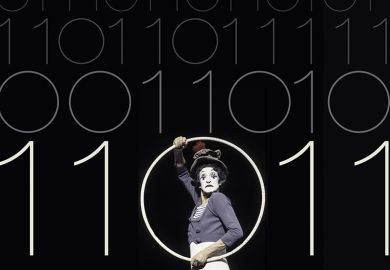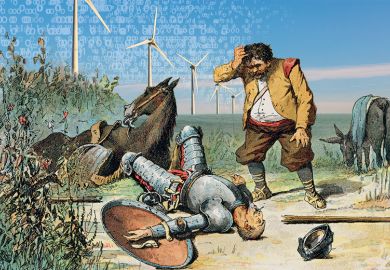Accents in Britain are still a hot issue. When Esther Rantzen launched her new BBC2 talk-show series last year, the first programme was devoted to domestic violence, and the second to - regional accents. In the warm-up to each show, the members of the audience are encouraged to express their vocal approval or disapproval of what the participants say. In the domestic violence programme, it was ten minutes or so before this happened; in the accents programme, it was less than a minute, as the audience loudly supported a Birmingham university lecturer who was defending his accent from a charge of "sounding thick". Why is accent such a sensitive issue? The question is not unique to the United Kingdom, but there is nowhere in the English-speaking world where the matter raises quite such intense emotions. Has it always been so?
Lynda Mugglestone's book is a meticulously researched account of the history of accent as a social symbol. She marshals all the evidence anyone would ever need to demonstrate that it has not always been so. Indeed, it is only at the end of the 18th century that accent became a major social issue. Between 1760 and 1800, books on elocution increased fivefold. Sixpenny manuals came to be sold in their thousands. A great deal of the interest in Talking Proper arises from its copious illustration from the many publications of the time. This quote from P's and Q's: Grammatical Hints for the Million (1855) might have come from many a modern English language quango: "A knowledge and practice of the rules of the English language are absolutely essential to respectability and a comfortable passage through decent life."
Mugglestone brings home what a profound shift in social sensibility there was, around the turn of the (19th) century. Regional accents had been accepted for hundreds of years. Chaucer's Reeve's Tale identifies Northern speech in Aleyn and John - and they are the educated people in the story, not the (London-accented) miller. It was no disgrace for the mid-18th-century gentry to speak with a provincial accent. But within 50 years, notions such as an "educated" or "public school" or "Oxford" accent had become nothing less than a national obsession. Technically impossible notions, such as "talking without an accent", became universally accepted stereotypes. The educated accent, called "received pronunciation" by the end of the 19th century, was identified by several specific features that the "uneducated accent" would lack, such as the presence of initial h (the "fatal letter", as it was called), final -ng (in fishing), and the pronunciation of letter r. The period also provides some surprises, for those who believe that accents are inherently beautiful or ugly: using a long a in bath, for example, was at first a marker of uneducated speech - "the preserve of inaccurate speakers, chiefly among the vulgar", as one contemporary put it.
It is difficult to appreciate now just how much attention was paid to these variables at the time: h alone became the chief social barrier in 19th-century society. Poor Letter H: Its Use and Abuse was a bestseller. Mugglestone reports a splendid quote from a book called How to Choose a Wife (1854): "So important indeed is the question of the use of h's in England . . . that no marriage should take place between persons whose ideas on this subject do not agree." The subordination of speech to writing also grew massively. What were called "Cockney rhymes", where a word with a written r was made to rhyme with one without (such as morn and dawn) were considered atrocities (and poets who went for aural rather than visual rhymes, such as Keats, were widely condemned for doing so).
The orthoepists felt they were doing the nation a real service, by stressing the importance of an educated accent. John Walker, whose pronouncing dictionary of 1809 went through over 100 editions (and at a guinea a time!), was in no doubt that, as most people in the country lacked the advantages that a "good" accent provides, it was his duty to guide them towards this ideal, so that more people could become equal and have access to fresh opportunities. The argument is still used, though these days more about Standard English than about accent. Also, these days, such arguments are phrased more in terms of pragmatic utility than of patriotic fervour.
Mugglestone gives the most thoroughly illustrated presentation of these issues I have seen. She begins with chapters on the rise of the notion of standard, the developing images of accent and elegance, and the specific role of h and other symbols as markers of a social divide. She then looks at the very important role of feminine proprieties of speech, the representation of accent in literature, and the way accent was handled in education. Her final chapter, which she labels "conclusion", is more an excursus into a fresh area, the role of the BBC. The whole is a valuable exercise in linguistic historiography. It is above all sociolinguistically aware, frequently referring to the realities of language variation as a perspective for the attitudes people hold.
In her literature (= the novel) chapter, she quotes widely from contemporary authors, especially that super-listener, Dickens, and makes several illuminating observations. I had not noticed how Uriah Heep, who always dropped his h's in expressing his 'umbleness, puts them in when he is unmasked at the end of the novel. And there is a useful discussion of the graphic conventions used by authors to identify uneducated speech: it is sometimes forgotten that when someone writes pritty for pretty, or collidge for college, they are making a social, not a phonetic point (for these words are in fact pronounced as the non-standard spellings suggest).
In an educational supplement, it makes sense to ask: what were the teachers and inspectors doing all this time? The answer is: for the most part, reinforcing these stereotypes as much as they could. Mugglestone quotes from one inspector's report of 1861 about teaching children to pronounce initial h: "Inferior teachers . . . tell me it is useless to try and teach the children to do so . . . on the other hand, a good teacher says nothing, but sets to work; and the next year every child . . . pronounces the h with correctness." She pays particular attention to the gradual growth of the public school system, with which eventually a good accent was to be identified.
Mugglestone's book is a serious read, enlivened by the occasional tongue-in-cheek observation, and thoroughly researched, though I was surprised not to see any reference to Ken Phillips's Language and Class in Victorian England (1984), another successful trawl through 19th-century linguistic attitudes. But Talking Proper is not just an academic exercise in understanding the past. Although attitudes to received pronunciation are undergoing a major shift, as we approach the 21st century there are still many 19th-century attitudes about. Those who have to make judgements about these matters, especially in education, would benefit greatly from the historical explanation and sociolinguistic perspective this book provides.
David Crystal's latest book is The Cambridge Encyclopedia of the English Language.
Talking Proper: The Rise of Accent as Social Symbol
Author - Lynda Mugglestone
ISBN - 0 19 823948 3
Publisher - Clarendon Press, Oxford
Price - £35.00
Pages - 353
Register to continue
Why register?
- Registration is free and only takes a moment
- Once registered, you can read 3 articles a month
- Sign up for our newsletter
Subscribe
Or subscribe for unlimited access to:
- Unlimited access to news, views, insights & reviews
- Digital editions
- Digital access to THE’s university and college rankings analysis
Already registered or a current subscriber? Login



